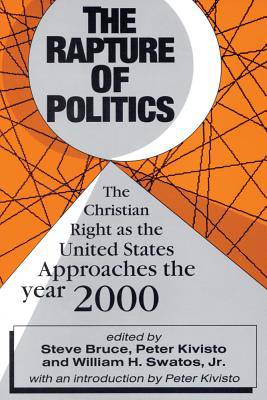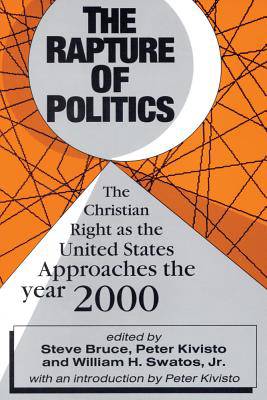
- Afhalen na 1 uur in een winkel met voorraad
- Gratis thuislevering in België vanaf € 30
- Ruim aanbod met 7 miljoen producten
- Afhalen na 1 uur in een winkel met voorraad
- Gratis thuislevering in België vanaf € 30
- Ruim aanbod met 7 miljoen producten
Zoeken
The Rapture of Politics
Christian Right as the United States Approaches the Year 2000
Steve Bruce
Paperback | Engels
€ 105,45
+ 210 punten
Omschrijving
Theologically conservative Protestants have entered the political arena with an agenda that is at once political and religious. Assessing the current impact of this New Christian Right (NCR) on American politics, the contributors to this new book present provocative and diverse perspectives on a phenomenon that has, despite its pervasiveness in American culture, been too little examined. While some contributors show a disdain for the NCR, others evince genuine sympathy for the movement.Steve Bruce takes aim at sociologists of religion who, in his estimation, have exaggerated the strength of the NCR. Clyde Wilcox believes the NCR attracts only a limited electoral following, and will have little success at the state and national levels. Stephen Johnson reports on voting patterns of Catholics, mainline Protestants, and conservative Protestants in Muncie, Indiana. And Phillip Hammond and his associates observe that the main fault line between conservatives and liberals is now over "family values." John Simpson singles out debates over abortion and homosexuality as the most potent cultural divisions arising out of the 1980s. Lyman A. Kellstedt and colleagues mark the 1992 presidential election as a watershed event, beginning a dramatic new cleavage in the two-party system. James M. Penning and Matthew C. Moen address issues related to NCR organizations and their place in the political arena.It is clear that the NCR will remain a part of the religious and political landscape lor some time, though there is little consensus over where the NCR will be located in that landscape. The Rapture of Politics will be of interest to political scientists, theologians, sociologists, and scholars of American culture.
Specificaties
Betrokkenen
- Auteur(s):
- Uitgeverij:
Inhoud
- Aantal bladzijden:
- 152
- Taal:
- Engels
Eigenschappen
- Productcode (EAN):
- 9781560008026
- Verschijningsdatum:
- 30/01/1994
- Uitvoering:
- Paperback
- Formaat:
- Trade paperback (VS)
- Afmetingen:
- 152 mm x 229 mm
- Gewicht:
- 248 g

Alleen bij Standaard Boekhandel
+ 210 punten op je klantenkaart van Standaard Boekhandel
Beoordelingen
We publiceren alleen reviews die voldoen aan de voorwaarden voor reviews. Bekijk onze voorwaarden voor reviews.







